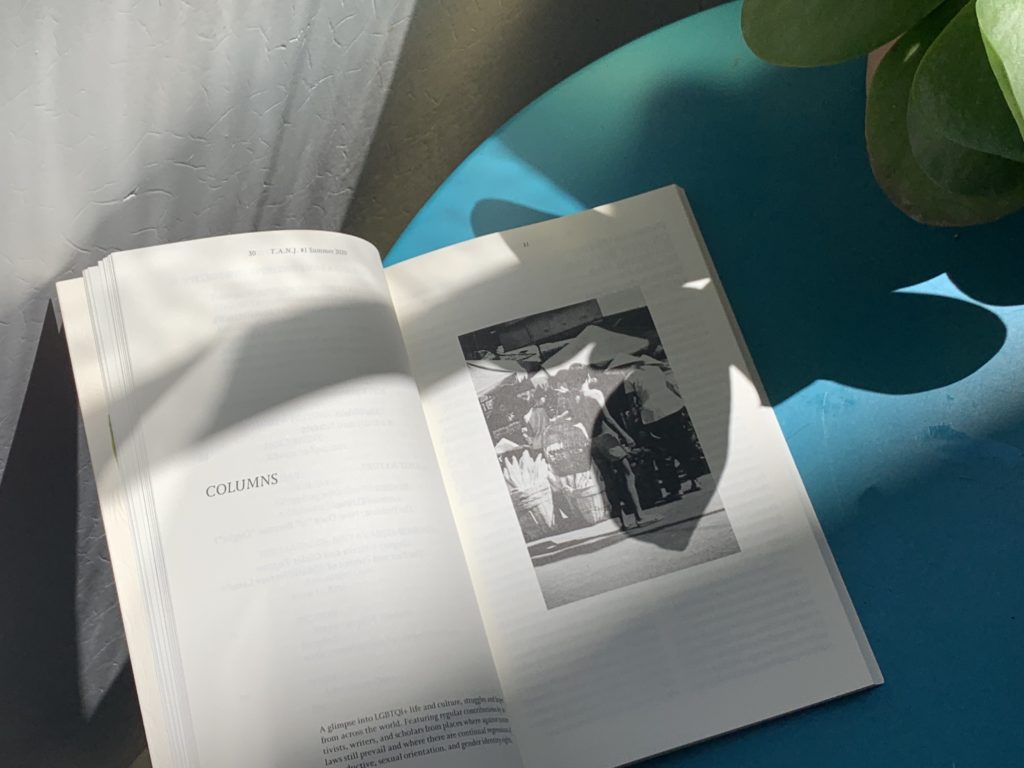LGBTQI of the Lebanese Revolution Don’t Need Permission

This text was one of the columns of The Against Nature Journal (T.A.N.J.) issue #1, published by Council in 2020.
The October Revolution (still ongoing) in Lebanon erupted due to cedars burning, the drop in currency value, and an exorbitant taxation placed on a failing infrastructure enabled by forty-five years of corruption.
The Lebanese Republic is governed by the Free Patriotic Movement, which is currently led by Gebran Bassil, an ex-minister and the son-in-law of the president. They propagate divisive racist, sexist, and homophobic slurs to control, demonize, and segregate the public with conservative and religious rhetoric, as indicated recently by Charbel Khalil, the director of programs at OTV, a TV channel owned and operated by the party: “Your homosexual deviance, your demons, your Mashrou’ Leila WILL NOT PASS. You’re dragging this country to destruction.”
The LGBTQI community did not infiltrate the revolution, but neither are we on its outskirts; LGBTQI is part of what makes up society in Lebanon, ranging from capitalists to communists, from the lower class to the upper, from young women to old men, and all the in-betweens. LGBTQI are Muslim, Christian, Druze, and atheists.
While Khalil and the sectarian leaders deliberate over whether to permit LGBTQI participation in society, we live and flourish in mundane and sublime moments.
We work in creative agencies, write television shows, direct films, and style your colleagues and favorite artists. We are dropping our children off at school, driving cabs, wrapping sandwiches, and working as bank tellers. The LGBTQI community is marching with mothers and fathers, with migrant workers and with refugees against classism, racism, elitism, sexism, and sectarianism, while defending the front lines with bodies and voices. LGBTQI distribute food, carry the wounded to first-aid tents, throw stones when enraged. Thousands stood shoulder to shoulder as sts penetrated the air dense with tear gas. “The Queers Built Beirut” is still etched into the concrete walls that separated the protesters from the Grand Serail.
The heart of the protests in the capital city was at the Ring, where the major highways converge. The Ring is also where the graffiti “Yas Queer” and “down with the regime” are seen side by side because they are one and the same. The highway that had once divided the country during the civil war has now been reclaimed by its free citizens: among the many revolutionaries that closed the Ring were the lesbians, trans*, gays, queers, and non-binary activists of Lebanon. And as the public squares filled with dialogue that the system had once worked so hard to isolate, protesters listened to one another when asked to refrain from using “gay” as a derogatory remark and “womanhood” as a weakness.
Revolution breeds clarity, and with it comes solidarity. Those that are oppressed can no longer be maligned when the same oppressor holds an iron fist over all our houses: the only time we are all considered equal is when we are subjugated to injustice and oppression. The queers are not the “unnatural” force that strangled the country but the “natural” revolution to free it from its shack- les. We did not infiltrate society. We are not deductible nor an alternative. We will not fade into the background or be sedated. The revolution is not queer; the queers are a revolution.
Dayna Ash is a cultural and social activist, playwright, performance poet, and the founder and executive director of the nonpro t arts organization Haven for Artists, based in Beirut, Lebanon.
TEXT BY
Dayna Ash
This text was part of The Against Nature Journal (T.A.N.J.) issue #1, published by Council in 2020.
Top image : T.A.N.J #1, Columns, 2020, Council.
T.A.N.J. #1
Articles
Thinking Through Religion
— Aimar Arriola
How to Binj
— Amatesiro Dore
A queer ‘we’?
— Linn Marie Tonstad
Columns
Pride in Jesus Church Service: Bridging the Divide in Barbados and the Caribbean
— Donnya Piggott
Antigender Agendas as Colonial Reestablishments in Brazil and Abya Yala
— Viviane Vergueiro
A Church Coalition’s Rainbow-Inclusion Efforts in India
— Pawan Dhall
The Trial of Kenya’s LGBT Community in the Court of Public Opinion
— Kari Mugo
LGBTQI of the Lebanese Revolution Don’t Need Permission
— Dayna Ash
Of Islamic Laws and the Colonial Past: The Conundrums Faced by the Malaysian LGBT Community
— Niza
Love in the Time of Corona
— Naoufal Bouzid
A Trojan Horse for Warsaw’s Castle
— Eliel Jones
Events
แปร่ง // praeng
– a project by Wirunwan Victoria Pitaktong & Jeanne Penjan Lassus, Bangkok, 2020
Introducing T.A.N.J #1
– online conversation with Vivek Divan, Kari Mugo, Linn Marie Tonstad & the editors